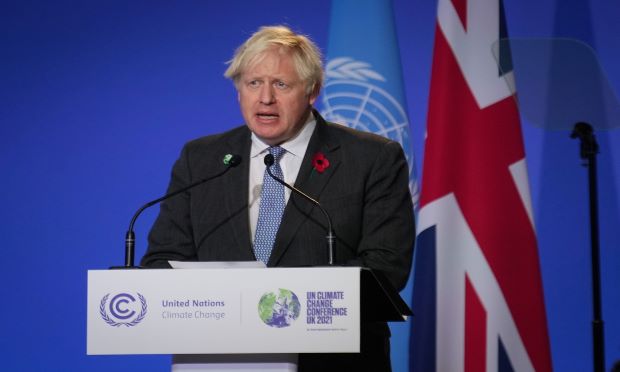Global leaders pledge to end deforestation by 2030

By Catrin Einhorn and Chris Buckley
GLASGOW – Leaders of more than 100 countries, including Brazil, China and the United States, vowed Monday (Nov 1) at climate talks in Glasgow, Scotland, to end deforestation by 2030, seeking to preserve critical forests that can absorb carbon dioxide and slow the rise in global warming.
The pledge will demand “transformative further action,” the countries’ declaration said, and it was accompanied by a number of measures intended to help put it into effect. But some advocacy groups criticized the pledge and the measures as lacking teeth, saying they would allow deforestation to continue.
Prime Minister Boris Johnson of Britain was scheduled to announce the deforestation agreement at an event Tuesday (2) morning attended by President Joe Biden and the president of Indonesia, Joko Widodo.
“These great teeming ecosystems — these cathedrals of nature — are the lungs of our planet,” Johnson is expected to say.
The governments committed $12 billion and private companies pledged $7 billion to protect and restore forests in a variety of ways, including $1.7 billion for Indigenous peoples. More than 30 financial institutions also vowed to stop investing in companies responsible for deforestation. A new set of guidelines offers a path toward eliminating deforestation from supply chains.
Many policy experts have praised the measures as representing an important step forward, while emphasizing that far more is needed.
“The financial announcements we’ve heard in Glasgow are welcome but remain small compared to the enormous private and public flows, often in the sense of subsidies, that drive deforestation,” said Frances Seymour of the World Resources Institute, a research group.
The pledges come amid growing awareness of the role of nature in tackling the climate crisis, something Britain has sought to highlight at the climate summit, known as COP26. Intact forests and peatlands, for example, are natural storehouses of carbon, keeping it sealed away from the atmosphere. But when these areas are logged, burned or drained, the ecosystems switch to releasing greenhouse gases.
If tropical deforestation were a country, it would be the third-biggest emitter of greenhouse gases in the world, according to the World Resources Institute, after China and the United States. Much of the world’s deforestation is driven by commodity agriculture as people fell trees to make room for cattle, soy, cocoa and palm oil. The value of healthy forests goes far beyond carbon. They filter water, cool the air and even make rain, supporting agriculture elsewhere. They are fundamental to sustaining biodiversity, which is suffering its own crisis as extinction rates climb.
Efforts to keep forests standing, nevertheless, have struggled. One effort, recognized in the Paris climate accord, seeks to pay forested nations for reducing tree loss, but progress has been disappointingly slow. Governments have made similar promises before, without making much progress in stemming the felling of forests for farming and commercial lumber. This year, scientists found that parts of the Amazon have begun emitting more carbon than they store.
A United Nations plan announced in 2017 made similar commitments. An agreement in 2014 to end deforestation by 2030, the New York Declaration on Forests, set goals without a means to achieve them, and deforestation continued. The new announcements bring in more countries and focus on putting guidelines in place.
The participating governments promised “support for smallholders, Indigenous Peoples and local communities, who depend on forests for their livelihoods and have a key role in their stewardship.”
Tuntiak Katan, the general coordinator of the Global Alliance of Territorial Communities and a member of the Shuar people in Amazonian Ecuador, praised the effort in Glasgow but questioned throwing money at a system he sees as broken.
“If this financing doesn’t work directly, and shoulder to shoulder, with Indigenous peoples, it’s not going to have the necessary impact,” he said.
China is one of the biggest signatories to the deforest declaration, but the country’s leader, Xi Jinping, did not attend the climate negotiations in Glasgow. Over the past decades, China has suffered heavy losses of forest as its population and industry have grown. But in recent decades, the country has pledged to regrow forests and expand sustainable tree farming.
By China’s estimate, forests now cover about 23% of its landmass, up from 17% in 1990, according to the World Bank. Some research has questioned the scale and the quality of that expanded tree cover, but the Chinese government has made expanded reforestation a pillar of its climate policies, and many areas of the country are notably greener than they were a couple of decades ago.
Still, China’s participation in the new pledge may also test its dependence on timber imported from Russia, Southeast Asia and African countries, including large amounts of illegally felled trees.
In a written message to the Glasgow meeting, Xi “stressed the responsibility of developed countries in tackling climate change, saying that they should not only do more themselves, but should also provide support to help developing countries do better,” Xinhua news agency reported.
-New York Times

